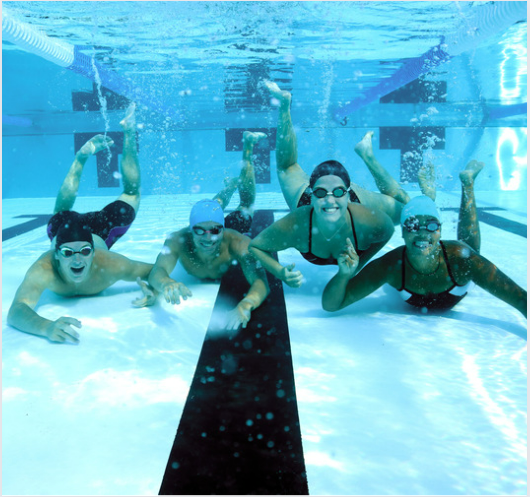50 Free World Record History

Swim Technique, Training, Motivation, Olympic Swimming
|
June 1, 2014
The Short Sprint Or 50 Free
At first glance, the history of the 50 Free appears as short as the race itself. And while it may not have been officially contested until the 1988 Olympics in Seoul, its origins can be traced back to the beginning of the 20th century.1904- The Short Sprint
In the 1904 St. Louis Olympics, the short sprint, made its first Olympic appearance. The course length was only 50 Yards (about 46 Meters). At the time, freestyle meant you could choose any stroke you wanted to swim, free from any mandate of stroke style. This was only time the 50 Free would be run in yards during the Olympics. The 50 Free wouldn't make a return to the Olympics for another 84 years, resurfacing at the 1988 Olympics in Seoul.The 1970's- The 50 Free Is Reborn
In the 1970's the 50 Free became an official event marked by the first recorded world records by Jonty Skinner (South Africa) at 23.86 in 1976 for the men and Kornelia Ender (East Germany) at 26.99 in 1975 for the women.What Makes A Great Short Sprinter?
The 50 Free is all about reaction and drop dead speed. Getting off the blocks the fastest and nailing your breakout are key elements. Some sprinters just get up and go, others choose to take advantage of underwater kicking. There is no tried and true. Oftentimes swimmers will breathe once or not at all. Frequently you will see swimmers utilizing a straighter arm stroke, like a windmill. Tempo is key. The top flight at the Olympics will and have all boasted a stroke tempo well under 1.0. Typically sprinters are a tall breed. Matt Biondi is 6'7" and Amy Van Dyken is 6'. Not a rule, just statistics. Long arms and legs are a huge plus.50 Free World Record History
Women's 50 Free World Record Holders
In the women's event, Kornelia Ender went on to be a multiple world record holder and multiple time Olympic medalist. However her victories are heavily tainted by the East German doping scandal. Johanna Malloy (CAN) was the next world record holder in 1977 at 26.95. In 1978 it was broken again by Anne Jardin (CAN) 26.74. Two years passed then American Cynthia (Sippy) Woodhead took it down to 26.61. The world record was broken three more times in that same year (1980) Kelly Asplund (USA) 26.53, Jill Sterkel (USA) 26.32 and Sterkel again at 25.96. Less than a year later in 1981 Sterkel lowered the mark one more time to 25.79. Two years later a young superstar in the making by the name of Dara Torres (USA) took the record down to 25.69. It was quickly snapped 6 months later by Annemarie Verstappen (NED) 25.64. Torres wasn't close to being out for the count one month later she lowered the mark to 25.62 and again to 25.61. Competition in the 80's was fierce but two years passed before the record was lowered by Tamara Costache (ROM) to 25.50. Costache lowered the record an additional three times over the course of a year to 25.28. Another two years passed before the record went to Yang Wenyi of China, she was the first woman to break the 25 second barrier at 24.98 in 1988. She lowered it to 24.79 and then her teammate Le Jingyi, suspected of steroid abuse but never proven, took over in 1994 taking the 50 down to 24.51. The record held for six years. In 2000 Inge be Bruijn (NED) tied the record of 24.51 but dropped it three times in one year, The record sat at 24.13 for eight years. In 2008 one of her country women Marleen Veldhuis lowered the mark to 24.09. Swiftly the record fell below 24 seconds in the same year to Australian Libby Trickett (Lenton) in 23.97. Then Veldhuis took it back in 2009 at 23.96. Today the record is held by Britta Steffen (GER) at 23.73 swum in 2009 at the World Championships held in Rome, Italy. Olympic Gold:- Kristin Otto (GDR) 1988 Seoul
- Yang Wenyi (CHN) 1992 Barcelona
- Amy Van Dyken (USA) 1996 Atlanta
- Inge de Bruijn (NED) 2000 Sydney
- Inge de Bruijn (NED) 2004 Athens
- Britta Steffan (GER) 2008 Beijing
- Ranomi Kromowidjojo (NED) 2012 London
Men's 50 Free World Record Holders
On the men's side, Jonty Skinner's record of 23.86 in 1976 was passed up a year later by Joe Bottom (USA) with a 23.74. Another year passed and Ron Manganiello (USA) took it down .02 to 23.72. The record next went to Klaus Steinbach (GDR) in 1979 with a 23.70. The USA men dominated the record board for the next 7 exchanges that all occurred over the course of 18 months. First Chris Cavanaugh in February of 1980 clocked 23.66, then in April he went 23.12. Rowdy Gaines was the first man to break 23 seconds throwing down 22.96 the same day at US Spring Nationals. Then Bruce Stahl took it down further at the same meet 22.83. Four months later Joe Bottom was at it again lowering the mark to 22.83 then again to 22.71. It took a year for the next change to come, this time from Robin Leamy at 22.54. His record would hold for four years. Dano Halsall (Switzerland) swam a 22.52 and held the record for a few months before Tom Jager (USA) took it down to 22.40. Matt Biondi held the world record next at 22.33 then it went back to Jager at 22.32. Jager lowered his mark once more in 1988 to 22.23. Then a South African named Peter Williams jumped in the middle of the USA boys taking the record down to 22.18. Biondi broke the record one last time with an Olympic gold medal in Seoul touching in at 22.14. Jager wasn't done yet and one year later swam a 22.12 then became the first man under 22 seconds in 1990 blasting out a 21.98, then a 21.81. 10 years later (goes to show how epic the Jager/Biondi exchange truly was) Russian Alexander Popov swam a 21.64 in 2000. Another 8 years pass until the record is broken by Eamon Sullivan (AUS) in 2008 with 21.41 and again the next day with 21.28. Frederick Bousquet of France let the record stand a month before he lowered it to 20.94 becoming the first man under 21 seconds. The record is held now by Cesar Cielo of Brazil from 2009 with a 20.91. This progression shows how dominant and truly excellent Tom Jager, Matt Biondi, and Alexander Popov were. Ahead of their time and completely relevant nearly 15 years later. Olympic Gold:- Matt Biondi (USA) 1988 Seoul
- Alexander Popov (EUN) 1992 Barcelona
- Alexander Popov (RUS) 1996 Athens
- Anthony Ervin/Gary Hall Jr (USA) 2000 Sydney
- Gary Hall Jr (USA) 2004 Athens
- Cesar Cielo (BRA) 2008 Beijing
- Florent Manaudou (FRA) 2012 Athens







Leave a Comment
Your email address will not be published. Required fields are marked *